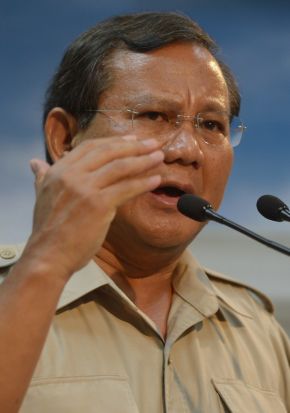Indonesia's presidential election
Fighting yesterday's battles

"WE MUST not hide from history," booms Prabowo Subianto, a heavily built former special-forces commander who wants to be Indonesia's next president. Mr Prabowo seems not to be referring to his own chequered past. That would include his dismissal from the army, following allegations of involvement in the disappearance of pro-democracy activists in the late 1990s. Instead the leader of the Great Indonesia Movement Party, better known as Gerindra, is telling the Jakarta Foreign Correspondents' Club how Indonesia risks becoming a failed state unless its politicians man up to the challenges it faces.
It is not hard to see why Mr Prabowo, a son-in-law to Suharto, Indonesia's 20th-century strongman, is one of the leading candidates to succeed Susilo Bambang Yudhoyono, whose final term as president ends next year. Mr Prabowo is an articulate and entertaining speaker. His attacks on established political leaders (the elite, as he likes to call them) for not having the "guts" to confront things like corruption resonate with voters who are fed up with Mr Yudhoyono's weak leadership. And there is some truth in his assessment of the problems that confront Indonesia: declining natural-resource revenues, an expensive and inefficient government, and a widening wealth gap.
Speaking of history, it turns out that Mr Prabowo is an admirer of Niall Ferguson, a neoconservative historian at Harvard. The two men share a predilection for dire prophecies. As the gathered correspondents tuck into their cake and ice cream at the InterContinental hotel's grand ballroom, Mr Prabowo warns of a frightening situation in which Indonesian Muslims return radicalised from sojourns in the Arab world. He pictures them as a new generation of jihadis, fomenting conflict in a divided country that has lost confidence in democratic institutions. This seems alarmist yet not altogether implausible.
But Gerindra's own six-point "Action Plan to Transform the Nation" seems aimed at winning villagers' votes, more so than solving these problems. It includes pledges to boost the role of agriculture and to do more for villages—policies that could have been lifted straight from an election pitch by Thaksin Shinawatra, Thailand's former populist prime minister (whom Mr Prabowo also admires). The Gerindra candidate departs from the neocon line in saying that he wants a "people's economy", something that combines the best of both capitalism and socialism. Free markets are fine in principle, he says, but Indonesia's economy is not sufficiently productive to compete. "Affirmative action" is needed to create a level playing field.
The details of Gerindra's policies can probably afford to wait for the time being. Mr Prabowo's main problem at the moment is Joko Widodo, the popular governor of Jakarta. Mr Prabowo had enjoyed a comfortable lead over all the other likely presidential candidates until Mr Widodo, known by his nickname "Jokowi", caused a political sensation by winning the Jakarta election in September 2012. Now Mr Prabowo is trailing Jokowi. This must be especially galling for Mr Prabowo because he was one of Jokowi's early backers.
Still, he is far from giving up. The presidential election does not take place until July 2014, and Jokowi has yet to declare himself a candidate for president. Mr Prabowo dismisses the widespread expectation that Jokowi is going to be his main competitor for the presidency: he calls it a conspiracy by the elite to "divide and conquer". He prefers to hint that he would like to see Jokowi stand as his vice-presidential running mate. This seems like terribly wishful thinking. And for all his skills as a campaigner, Mr Prabowo may in the end find it difficult to avoid taking his own advice. At some point between now and next July he ought to face some difficult questions about his own history.
(Picture credit: AFP)
| Reply via web post | Reply to sender | Reply to group | Start a New Topic | Messages in this topic (1) |
to Subscribe via email :
batavia-news-subscribe@yahoogroups.com
----------------------------------------
VISIT Batavia News Blog
http://batavia-news-networks.blogspot.com/
----------------------------
You could be Earning Instant Cash Deposits
in the Next 30 Minutes
No harm to try - Please Click
http://tinyurl.com/bimagroup
--------------
No comments:
Post a Comment